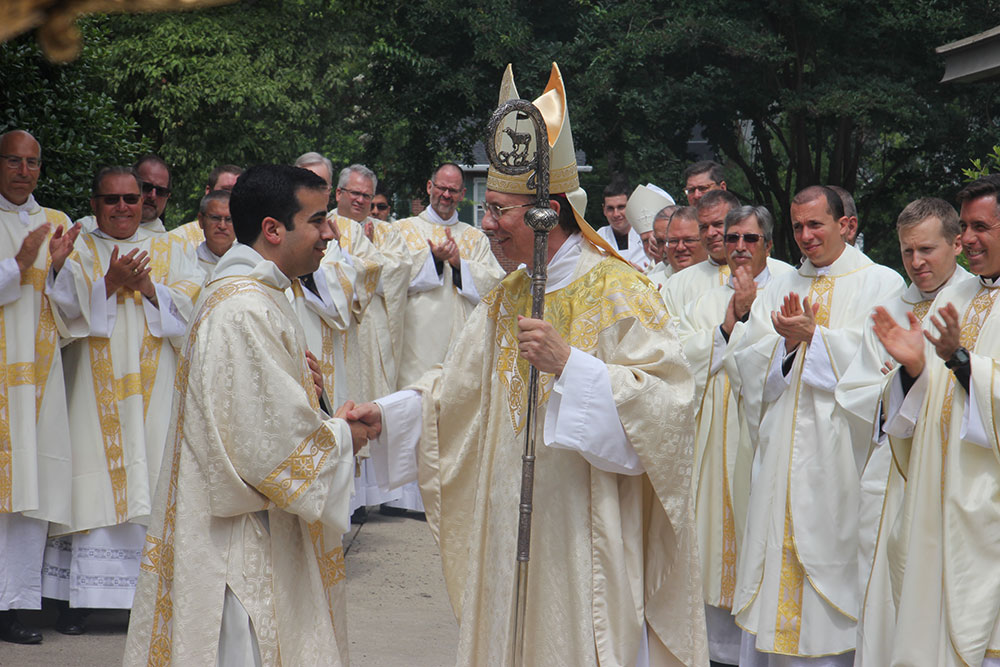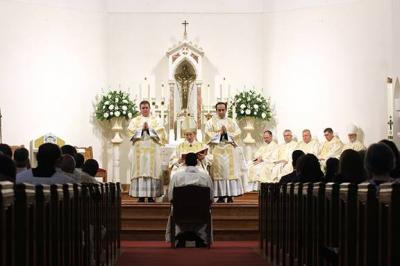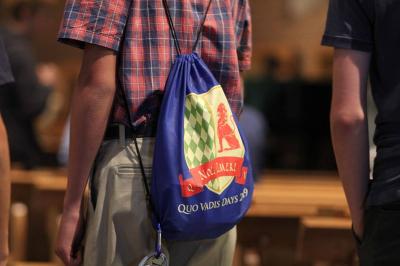Young men consider: Where are they going?
BELMONT — Dozens of young men from around the Diocese of Charlotte descended upon Belmont Abbey College June 10-14 for the diocese’s annual five-day vocations discernment camp called “Quo Vadis Days.”
The goal of Quo Vadis Days is to challenge young men to ask the fundamental question, “quo vadis,” or “where are you going?” while equipping them with the tools and opportunity to discern God’s will for their life.
Priests and seminarians of the diocese interacted with more than 80 young men during the week-long camp that included talks by clergy, seminarians and others about the vocations to the priesthood, marriage and fatherhood.
The young men also toured the construction site of St. Joseph College Seminary in Mount Holly on June 11. The site is located near Belmont Abbey College, where the seminarians pursue their bachelor’s degrees while beginning discernment of a vocation to the priesthood.
Father John Putnam celebrated Mass for the retreat participants June 12 at Mary Help of Christians Basilica in Belmont. He also served as homilist, tailoring his message to the young men, who ranged in age from 15 to 19, as they discern which vocation God may be calling them to in their lives.
During his homily, Father Putnam reflected on the reality and the importance of fatherhood. The saints, he said, show the way by how they sacrificed everything for the Gospel.
“That willingness of sacrifice is something we all need to be aware of,” Father Putnam said. “Because, to some degree, it is part and parcel of manhood. Each of us, whether we know it or not, we want to sacrifice ourselves for something.”
He shared that there are two forms of fatherhood: physical and spiritual.
“Both of them are very important because natural fatherhood impacts how we understand spiritual fatherhood. In both aspects of fatherhood, fidelity and holiness are absolutely essential,” he said.
He stressed that each of them needs to understand that they were made in the image and likeness of God, are a son of God and are beloved of God.
“I hope what each of you gleans during your time at Quo Vadis is that interior desire to spend yourselves in something greater than yourselves,” he said.
Phillip Icard of St. Joseph Vietnamese Church in Charlotte, 17, is a rising high school senior. This is his second year attending Quo Vadis Days.
“The first year I really wanted to look for a way to cement my faith,” Icard said. “I was a little uneasy about whether I believed in God or not. After the first year, I knew what it meant to be Catholic, so I wanted to come back and grow in my faith even more.”
First-time retreat participant Hayden Raines, 15, is a rising junior. “I’m enjoying the retreat very much. Praying and the Adoration chapel are my two favorite things,” he said.
The retreat has drawn nearly 600 attendees over the past seven years.
“We have a fantastic group of young men here this year,” said Father Jason Barone, diocesan vocations promoter. “I hope they take away not only a lot of useful tools to help them to discern why God has placed them on this earth, but also an experience of fellowship and fraternity with other serious-minded young men who take their faith and their vocation seriously as well.
“I hope that experience is able to stay with them and fortify them, and during their times of difficulties that it helps them become better men – no matter what God has in store for them.”
— SueAnn Howell, Senior reporter
Be a model of holiness, diocese's newest deacon told
 Bishop Peter Jugis congratulates Deacon Jonathan Torres after his ordination June 8 at St. Patrick Cathedral in Charlotte.
Bishop Peter Jugis congratulates Deacon Jonathan Torres after his ordination June 8 at St. Patrick Cathedral in Charlotte.
Jonathan Torres ordained to the diaconate June 8
CHARLOTTE — During his ordination Mass June 8, the Diocese of Charlotte's newest deacon was encouraged to persevere in his formation for the priesthood and to follow Jesus Christ as his model of holiness.
Jonathan Torres was ordained to the transitional diaconate by Bishop Peter Jugis at St. Patrick Cathedral, during a Saturday morning Mass that drew more than 19 priests, 14 deacons, seminarians and hundreds of faithful.
Torres is a seminarian at the Pontifical College Josephinum in Columbus, Ohio, and his ordination to the transitional diaconate marks one of the last steps on his journey to the priesthood.
At the start of the ordination rite, the diocese's vocations director, Father Christopher Gober, attested to Torres' preparedness for ordination. Torres was then called from his parents' side to stand before the bishop at the steps of the altar.
Bishop Jugis then stated, “Relying on the help of the Lord God and our savior Jesus Christ, we choose this man to the order of the diaconate."
Everyone gathered replied, “Thanks be to God,” and broke into a thunderous round of applause.
During his homily, Bishop Jugis entreated Torres to be a model of holiness for others.
“Today the sacrament of holy orders marks you with an indelible spiritual character which configures you to Christ the servant, who came not to be served but to serve and to give His life as a ransom for many,” the bishop said. “You are consecrated by the laying on of hands and established in the state of holiness by the grace of the Holy Spirit."
Holiness is expected of the clergy, he continued. The people of God want the sacred ministers of the Church to be models of holiness for them, to serve them in holiness, and to inspire and help them to greater holiness.
“They have a right to expect this holiness because of the grace of the Holy Spirit that is communicated in the sacrament of holy orders,” Bishop Jugis said. Show Gallery“In these very challenging times in the Church, everyone must make a renewed commitment to holiness – and especially the clergy. Holiness restores the beauty of Christ’s bride, the Church, which has been soiled by abuse and scandals. Holiness comes through union with God. He is the Holy One!”
Show Gallery“In these very challenging times in the Church, everyone must make a renewed commitment to holiness – and especially the clergy. Holiness restores the beauty of Christ’s bride, the Church, which has been soiled by abuse and scandals. Holiness comes through union with God. He is the Holy One!”
Bishop Jugis then spoke to Torres about the responsibilities he will assume in the role of deacon: to discharge his duties with humble charity; to hold fast to the mystery of faith with a clear conscience; to maintain and deepen his prayer life through the Liturgy of the Hours; and to conform his way of life to serve the people of Christ.
“May the good Lord help you to persevere faithfully in this resolve that you promise. Jesus is your model of holiness,” the bishop said.
“In these very challenging times in the Church, everyone must make a renewed commitment to holiness – and especially the clergy. Holiness restores the beauty of Christ’s bride, the Church, which has been soiled by abuse and scandals.” — Bishop Peter Jugis
Bishop Jugis also explained to Torres that “the Lord has given you the gift of celibacy so you may offer the whole of your life, your love to the Lord, your service. Celibacy is a sign of pastoral charity, offering yourself pastorally in charity to serve others. Celibacy is a source of great spiritual fruitfulness in the Church and in the world.”
After the homily, Torres stood before the bishop and publicly affirmed his intention to serve him and the Church. Then he prostrated himself before the altar as Bishop Jugis knelt in prayer and the faithful chanted the Litany of Supplication (also known as the Litany of the Saints).
Torres then arose and approached the bishop, who laid hands on Torres’ head and prayed the prayer of ordination over him, thus consecrating him as a deacon.
Deacon Torres was vested by Father Patrick Winslow, his pastor at St. Thomas Aquinas Church in Charlotte. He received a stole, a sign of the deacon’s office of service, and the dalmatic, the outer garment used in the liturgy.
The newly-vested deacon then again approached the sanctuary, receiving the Book of the Gospels from Bishop Jugis and a fraternal kiss of peace to welcome him to his new role in the Church.
In his closing remarks to Torres, Bishop Jugis said, “Jonathan, a whole new life now opens before you – the life of being a deacon of the Church. You will now change by the action of the Holy Spirit.”
Deacon Torres will serve at St. Therese Church in Mooresville this summer until he returns to the Pontifical College Josephinum this fall to complete his final year of formation.
— SueAnn Howell, senior reporter
Meet Deacon Jonathan Torres
Deacon Jonathan Torres is the son of John and Lucy Torres of Huntersville. He is the oldest of eight children. He earned a bachelor's degree in English literature from Belmont Abbey College and studied theology at the Pontifical College Josephinum in Columbus, Ohio.
CNH: When did you first realize you had a vocation to the priesthood?
DEACON TORRES: Growing up, I always wanted to get married and have a family like my parents did. It was my brother Matthew who always wanted to be a priest (as fate would have it, Matthew is now married and has three kids, while I’m but a year away from becoming a priest).
During my time at Belmont Abbey, I began to study literature, which did wonders for my faith. While I grew up in a good Catholic family, my experience of Catholicism had become rather dull. For years, the practice of my faith felt too routine. Studying literature at Belmont Abbey helped me see how beautiful my Catholic faith was. In particular, reading Dante’s "Divine Comedy" was a major factor in me coming to love my faith in a new way. I had known the truths of my faith all my life, but it wasn’t until I experienced its beauty expressed in classic literature that I began to desire God more. Needless to say, my faith, which had become mundane, had now become something I was passionate about. Having a good group of friends at Belmont Abbey to discuss new ideas we learned in our literature, philosophy and theology classes was something that consumed all of my time.
After graduating I wanted to be a novelist, where I could express the same beauty that inspired me to live an all-consuming Christian life. I landed an editing job at St. Benedict Press, where I worked with renowned professors from all around the country to create Catholic Courses, a video lecture series that discussed topics such as history, literature, philosophy, theology and scripture. It fit well with my love of literature and my Catholic background. However, after working there for a year, I felt something lacking in my life.
In the summer of 2013, a good friend of mine entered the seminary. When he came back the next summer to begin his first summer assignment, he invited me to dinner with a few priests of Charlotte (Fathers Patrick Winslow, Matthew Kauth and Timothy Reid). Something happened during that dinner. It was as though scales fell from my eyes, and I saw before me men who did not live compartmentalized lives.
During my year at St. Benedict Press, I felt like I had divided my life in a very unattractive way; I had my faith-life on Sunday, my work-life during the week and my social-life on the weekends. I knew I wanted something more – something more full and encompassing. The life of a priest was the answer to that desire.
Further, the concepts of epic adventures, perilous journeys and a hero’s quest for goodness that I fell in love with in so many stories in the literature that enkindled the fire for my faith, found its fulfillment in the priesthood. The idea that I could experience life to the fullest in a single day (from baptizing a child, to celebrating a wedding, to presiding over a funeral) filled me with awe.
CNH: Is there any comment you would like to share about becoming a transitional deacon here in the Diocese of Charlotte?
DEACON TORRES: My parents have done so much for me over the years, from passing down the faith, to supporting me in my vocation. A simple “thank you” would not suffice. I feel like responding to the call to the priesthood is a way in which I can give back to those who have first given to me. Even beyond my parents, there have been so many people – friends, priests, fellow parishioners at numerous parishes in the diocese – who have given me more than I deserve. They have opened their homes to me, supported me financially, and have shown me love in so many different ways. I feel extremely grateful for this opportunity to give back to a community that has given me so much throughout my life.


